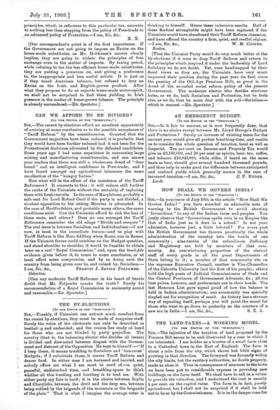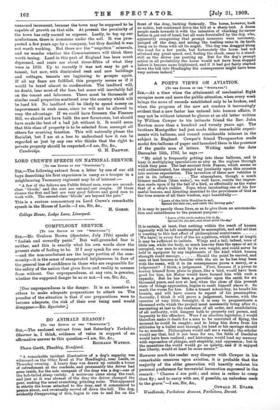THE LAND-TAXES.---A WORKING MODEL.
[TO THE EDITOR Or TIIR "SPROF4T011."1
SIR,—The injustice of the taxation of land proposed by the Finance Bill seems to be well illustrated by a case in which I am interested. I am holder as a trustee of a small farm close to a Cathedral town in the East of England. The farm is about a mile from the city, which shows but little signs of growing in that direction. The farmyard was formerly within the city limits, but the sanitary authorities, no doubt properly, made us close it. Thus in consequence of nearness to the town we have been put to considerable expense in providing new buildings on the farm itself. We shall have to call in a valuer to provide the valuation, and I understand the cost is usually
per cent. on the capital value. The farm is, in fact, purely agricultural, but I shall not be surprised if it shall be held not to be so by the Commissioners. It is in the danger zone for unearned increment, because the town may be supposed to be capable of growth on that side. At present the proximity of the town has only earned us expense. Lastly, to top up our misfortunes, there is ironstone under the soil. It was pros- pected a few years ago by a company, but they decided it was not worth working. But there are the " ungotten " minerals, and we wonder whether the Commissioners will think them worth taxing. Land in this part of England has been much depressed, and rents are about three-fifths of what they were in 1870. Up to recently it was not easy to get a tenant, but now, with diminished rent and new buildings and cottages, tenants are beginning to prosper again. If all my fears are fulfilled, this property seems as if it would be taxed almost to confiscation. The landlord will, no doubt, bear most of the loss, but some will inevitably fall on the tenant and labourers. There must be thousands of similar small properties scattered over the country which will be bard hit. No landlord will be likely to spend money on improvement in such cases, since he will not be allowed to reap the advantage. If we could have foreseen the Finance Bill, we should not have built the new farmhouse, but should have made the best of a bad job without it. It would seem that this class of property is to be selected from amongst all others for crushing taxation. This will naturally please the Socialist, but I am at a loss to understand how it can be regarded as just by any one who thinks that the right to private property should be respected.—I am, Sir, &c.,







































 Previous page
Previous page